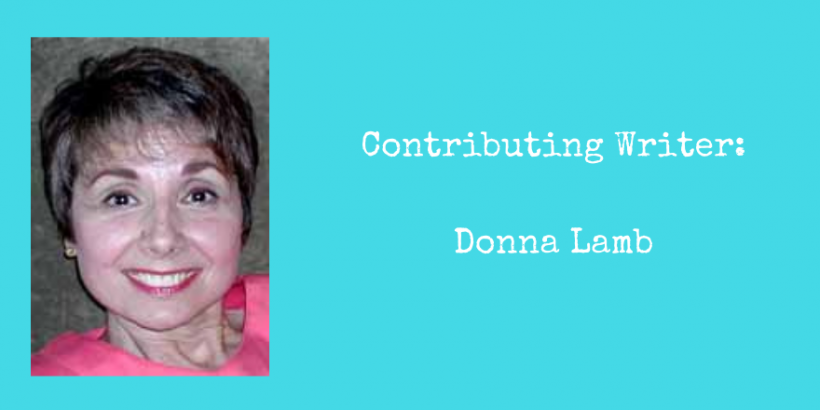The “Be-You-Tiful Hairitage” of Locks Celebrated in Brooklyn

by Donna Lamb
December 2001/January 2002
As I, a white woman, have been examining and opposing the form of racism known as “white privilege,” I’ve been affected by how much it has to do with hair. Like every person, I’ve had my share of “bad hair days” and have disliked my hair because of some quality. It is straight and of a nondescript brown, when I would have much preferred curly red hair. But whatever I’ve gone through about my hair, I’ve never been made to feel that it, just by what it is, was seen as unacceptable, even ugly, by society’s standards. And on a job, I’ve never been given the message that I’d better play down or even chemically alter my hair’s natural state because its obvious Eurocentricity could jeopardize my position.
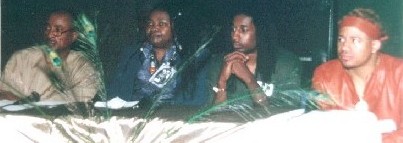 Photo Credit: Anthony Williams Panel Discussion: Ademolla Mandella, Nzingha Sanders, Eternal Polk & Thando Kafele |
On Sunday, October 21st, at New Bein’ Enterprises’s fourth Locked Hair Conference, titled Intertwined V: “Made in the Image Of…” I was learning about what people of African descent have been put through in this country as to their hair, because hair, as much as skin color, is at the core of self-identity. Historically, Black hair has been portrayed negatively, and this has not only adversely affected people’s sense of self-worth and skewed their standards of beauty, but has impeded their money making abilities.
This all-day conference, held at Pratt Institute in Brooklyn, addressed these issues dynamically; however, the main purpose of Intertwined was “to create a space where people could celebrate and explore their ‘hairitage’ and rejoice in their natural, God-given beauty–a space to examine ‘be-you-ty’ deeply, from the inside out.”
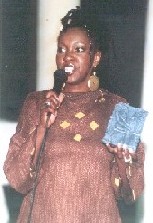 Photo Credit: Anthony Williams Nekhena Evans, Conference Producer |
Nekhena Evans, the nationally acclaimed master locktician, beauty culturist and author of Everything You Need To Know about Hairlocking, produced this conference because she wants to encourage people to “get in touch with the beauty, the power that is within you. God put it there, and from that place in yourself everything is possible. We have been brain-stained,” she continued, “given a lesser valuing of ourselves from society. Then we took it in and came to believe it ourselves about ourselves. I want to break the chains of that kind of thinking.”
Ms. Evans said too: “I feel that this is sacred work. This is divine space I am creating. I’m dealing with self-identity, self-esteem, reclaiming of one’s legacy–and healing. I consider myself a healer. I see this as my ministry.”
Something For Everyone!
There were workshops such as the one presented by Master Braider and creator of Ebo Lock Extensions, Marion Council-George, on how to lock hair pieces for style and versatility. Nadira Evans gave a Creative Lock Styling workshop in which people received hands-on instructions in styling techniques from simple daytime wear, to very artistic hair wraps for an event when you want to really stand out.
Throughout the day the main stage of the conference featured non-stop live musical entertainment as well as other cultural, spiritual and educational presentations. The music ranged from gospel to rap, and there were African storytelling, dance performances, as well as breath meditation and visualization exercises.
Natural Hair Care & Economic Empowerment
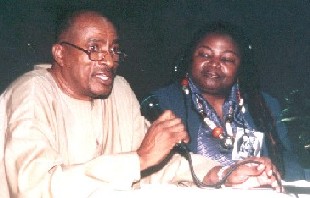 Photo Credit: Anthony Williams Panel Discussion: Ademolla Mandella & Nzingha Sanders |
Ademolla Mandella, author of Authentic Hair, a book of poetry and photography celebrating the beauty of natural hair, spoke of what a triumph it is that a grassroots natural hair care industry is now being build by Black individuals; however, he cautioned: “We know what’s happened before, and we have to see how to maintain what we’ve created. If we’re not careful, this industry will be taken from us like all the others. We’re the only ones who use Black hair products, yet 60% of the industry isn’t owned by us. It’s time that we start looking at ourselves as manufacturers and industry leaders. We should own this industry, not just purchase it!”
The next speaker was Nzingha Sanders, the proprietress of Nzingha’s School of Beauty, the first licensed Black-owned school where a Black hair curriculum is being taught. Ms. Sanders told the audience that along with teaching everything from weaving to braiding to the latest style trends for Black hair, “We also teach salon management because we believe in economic empowerment. White people have their own agenda for us and we have to really get organized and learn how to work within the system to counter that. We Black people are at war; we have been for 500 years, and it’s still true here in the cosmology industry. Madame CJ Walker laid it all out and handed it over to us, but we lost it, and now it’s time to come full circle and get control of our own destinies!”
Locked Hair & Job Discrimination
Mr. Polk said that all over the country people are being subtly intimidated, or not so subtly informed that wearing locks will impede their professional advancement. “If you’re trying to adhere to your cultural heritage, claim your religious rights,” He stated, “you shouldn’t have to compromise your ability to make a living. But that’s exactly what is happening.”
“In our particular case,” Mr. Polk continued, “all of us have our hair locked for very spiritual and religious reasons. We want to know: how do you legislate someone’s religious beliefs? No one else in the company had to justify their religion, their spiritual practices and how they express them. The Jews who wear yarmulkes don’t have to give a reason for why they do that.”
Mr. Polk was asked how the African American community should see using FedEx services. He replied: “People have to make a choice about whether they want to use a company that discriminates against people in this manner. Whenever you think of using FedEx I want you to imagine brothers being locked up in a room with three managers bombarding them with questions about their spiritual, religious beliefs, trying to convince them to cut their hair. I want you to imagine brothers, just because they have locks, being handcuffed to chairs and questioned about other items that had nothing to do with anything. I also want you to think about the fact that this is 2001 we’re talking about. We went through this with afros, braids, and now we’re going through this with locks. If you have spiritual and religious beliefs that you want to hold onto, we all have to act, and do and be different in this new millennium.”
Beauty Both Without and Within
The hairstyles were stunning! There was amazing diversity in the ways they often combined an elegant upsweep with something that cascaded downward. In other styles, the hair was confined in some way and then burst forth with energy, as seen in one by Nadira Evans where the hair was braided tight against the scalp with gold and purple cords woven in–until it reached the crown where the unconfined locks erupted exuberantly.
The deep meaning of it all was described by Nekhena Evans who said: “It’s not about what’s on the outside, it’s about what’s in your heart. Glory be to the One On High because we want to be His reflection. You want people to look at you with your beautiful crown of locks, and you want them to know that what they’re seeing is a beauty that is coming forth from the spirit, the synchronicity of what’s on the outside and what’s on the inside.”
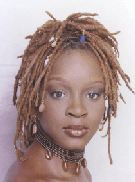
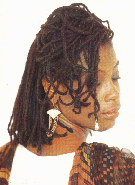
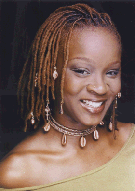
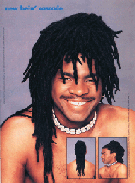
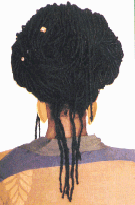
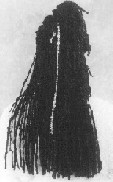

Photo Credit: Anthony Williams
Donna Lamb is a feature writer for The African Sun Times and a weekly columnist for the San Antonio Register. Articles by her on issues of social and economic justice have appeared in newspapers nationwide. She can be contacted at dlamb@gis.net.
Copyright © 2001 Donna Lamb and The Multiracial Activist. All rights reserved.

